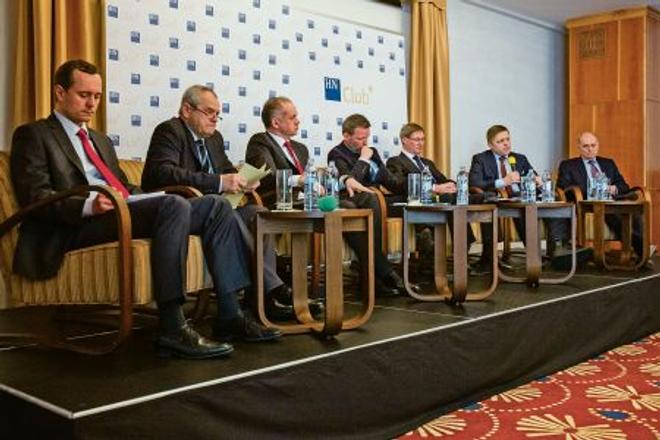IN THE closely watched first presidential debate, just two days after the official campaign began, the four candidates pledged to unite against Prime Minister Robert Fico in the second round of the election. But with a little more than a week before voters go to the polls, it is becoming less clear who will face Fico in the run-off.
The atmosphere of the March 3 debate, which was organised in Bratislava by the Sme daily and the Trend economic weekly, remained largely civil, with the four participants reluctant to exchange more than just symbolic attacks.
Fico, who currently refuses to communicate with Sme, did not attend the debate. As a symbol of his absence, the organisers left one chair unoccupied, with only a walking stick leaning against it, pointing to Fico’s current condition after he injured his Achilles tendon.
Throughout the debate, each candidate made the same arguments they had been making since announcing their candidacy. Andrej Kiska highlighted his business skills and charity experience, Radoslav Procházka painted himself as a strong president who will stand up for people’s rights, and a breath of fresh air serving as a positive example for the young generation. Milan Kňažko pushed what he called his readability for voters and his role in the emergence of the post-1989 Slovakia, and Pavol Hrušovský drew from his conservative views and his experience from 25 years in politics.
All for one
The debate saw the four candidates strike a deal whereby they would support whichever of them makes it to the second round to face Fico.
“I will do everything to prevent Robert Fico from becoming president,” Hrušovský, who faced accusations of allying with Fico’s Smer over the draft constitutional amendment that his Christian Democratic Movement (KDH) party and Smer proposed together, responded.
Kiska, Kňažko and Procházka all pledged to support each other in the second round. Kiska said he would offer not only his moral support, but also all of his billboards to whichever candidate makes it to the run-off against Fico.
“Thank you,” Kňažko was quick to react to his offer.
Kňažko and Procházka expressed support to each other at the end of the debate when asked whom they would vote for if they were not running in the race.
“I will vote for you anyway, one vote will not decide it; but my wife will not,” Kňažko told Procházka in the end.
Hrušovský and Kiska did not specify which of their competitors they would choose.
Generally, the debate saw little tension or conflict between the candidates, as their main rival, Fico, was absent.


 Presidential candidates at the HNClub debate. (source: SITA)
Presidential candidates at the HNClub debate. (source: SITA)